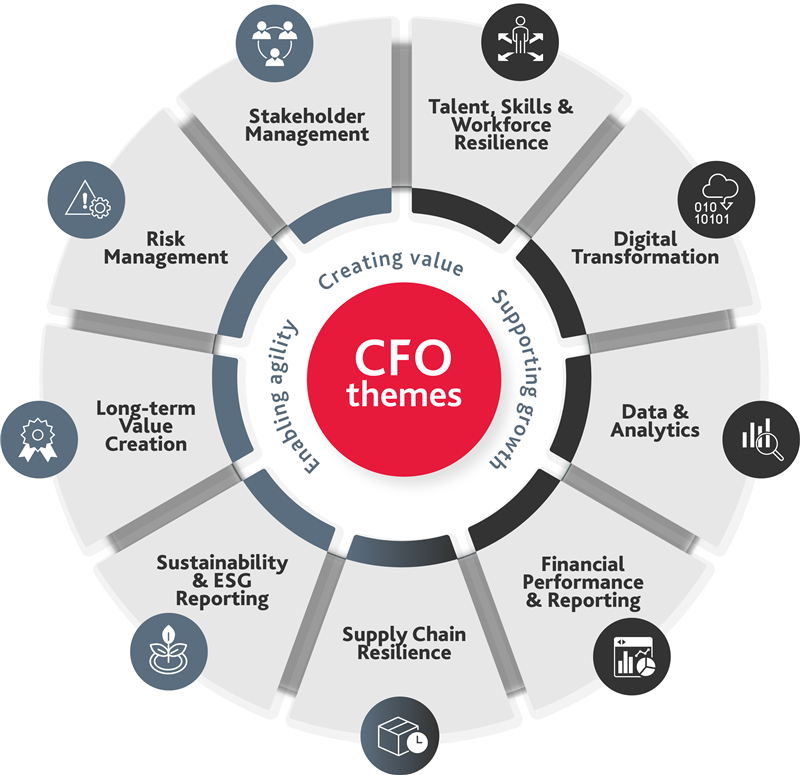The evolution of the Chief Financial Officer (CFO) into a more value centric role, akin to a Chief Value Officer (CVO), is an essential element of building a finance function of the future.
In addition to fulfilling core responsibilities, such as compliance and reporting, navigating tax and regulation, and driving growth, today’s CFOs must act as strategic leaders, advising organisations on non-financial aspects depicted in our interactive CVO wheel below. Each one of these responsibilities is key to creating value, enabling agility, and supporting the growth of an organisation.

In our report Chief Value Officer – the important evolution of the CFO, published in association with the ACCA, we identified several important success factors which these case studies illustrate.
Where are you in your journey to building your finance function for the future?

A value centric approach
CFOs are now responsible for getting the balance right between short-term objectives and long-term value creation. As exemplified in one case study in this series, these two seemingly conflicting objectives can represent a harmonious balance. The Chief Value Officer (CVO), as the right hand of the chief executive officer, is responsible for delivering value-driven strategic success. The link between an organisation’s values and the delivery of value to stakeholders is also clearly articulated.Many of the CFOs we interviewed highlighted how through strategic goals and reporting the organisation delivers for the public good. Whilst the stakeholders may not be readily identifiable beyond the financial lens, as demonstrated by a practical example using tools such as the IIRC’s Integrated Reporting Framework (which has now been incorporated into the work of the IFRS Foundation) can provide a ready lens for the reporting of value.
Long-term sustainability vs short term profitability?
Investment in a sustainable future requires a balance of people-, profit- and planet-centric views of performance, often challenging traditional approaches to business case development and investment appraisal.Measuring a truly value-centric view of performance relies upon the finance function having a clear understanding of the organisation’s operating model. As the case studies demonstrate having a holistic view of performance can drive substantial growth, often in organisations whose purpose clearly demonstrates how society benefits from their existence.
Ensuring robust and trusted data
The role of the finance function in delivering data governance across the organisations is paramount. In a value centric performance model this data does not simply include financial elements, it also embraces less structured data that supports strategic objectives around natural, human and intellectual capitals. Establishing and maintaining integrity over these data sources presents new challenges for the finance function. Sound insight and strategic guidance are built upon this base.Each of these case studies are a strong testament to the evolution of the CFOs interviewed into being a CVO. They underpin how the effective finance function is critical to organisational success. Yet that function must adapt to the changing world in which it operates.
Value does not compromise profit; it makes profit stronger in the longer-term.
Goodbye to the CFO, hello to the Chief Value Officer
Research by the Association of Chartered Certified Accountants (ACCA) and BDO reveals how the role of the CFO is evolving beyond finance to include sustainability, social impact, and non-financial reporting areas. Over 100 CFOs and business leaders from around the world took part in roundtables and in-depth interviews to share their insights into how the traditional role of the CFO is changing, resulting in the report 'Chief Value Officer - the important evolution of the CFO'.Contact us to hear more about how we can help.
Copyright © 2023 by the Association of Chartered Certified Accountants (ACCA). All rights reserved. Used with permission of ACCA. Contact insights@accaglobal.com for permission to reproduce, store or transmit, or to make other similar uses of this document.


